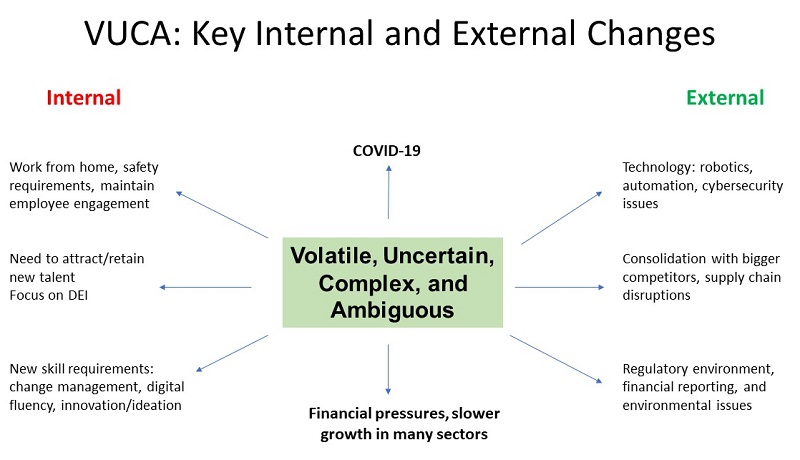ATD Blog
Helping Leaders Become Great Change Sponsors
Wed Apr 14 2021

Change is a permanent and accelerating feature of today’s organizations. Multiple drivers, including the ones listed below, contribute to VUCA (volatile, uncertain, complex, and ambiguous) conditions:
The global pandemic
Internal challenges relating to talent and employee engagement
External shifts in marketplace dynamics, regulatory requirements and technological advances

To survive and thrive in this tumultuous environment, organizations must proactively anticipate, adapt to, and promote change. However, most change initiatives do not fully achieve their intended objectives. McKinsey & Company research reports a failure rate of 70 percent or higher. In this context, change management is a critical leadership competency to increase the odds of resiliency and achieving success.
With effective change management, the people side of change is fully integrated with the project plan. This allows leaders to address how and when to bring identified stakeholders along on the change journey and to help address communications, training needs for new skills and jobs, rewards and recognition options, and role models for new behaviors.
One common feature of change models, which are diverse and make it possible for people to chart the course of change, is the emphasis on change sponsors accelerating change adoption and achieving expected business outcomes. Change sponsors are typically at the executive level. This means they hold influence and power related to their position, making them key to successful implementation of change. Their value includes providing key resources, increasing visibility to the change initiatives, and communicating support. This specific change role cannot be delegated to others due to its unique organizational weight.
Essentially, change sponsors provide:
Active and visible leadership for the change
Alignment of critical stakeholders and priorities
Influence on go/no-go decisions
Access to resources and budgets
Capability to remove barriers
Reinforcement of milestones and progress
Line of sight into corporate trade-off decisions
However, few change sponsors are great ones. Competing priorities, lack of awareness of what "great" looks like, skill gaps, and other factors may limit the potential impact of these sponsors.
Engaging with change sponsors requires being judicious about their time and defining how to deploy their unique power at the right time, with the right message, in the right way. With the painful reality that multiple and significant change initiatives often occur concurrently in organizations, it is important to be thoughtful about a communications rollout. Define when change sponsors are the most effective messengers compared with others, as well as the key leverage points that only they can convey. Other change messengers play essential but different roles: first-level supervisors can personalize information about change with their direct reports; designated change agents can leverage their peer-level influence skills; and functional leaders effectively address what the change will mean to their respective function (such as IT, R&D, sales, and HR).
To help change sponsors achieve greatness, a fundamental requirement is to define what and how you plan to work together because this relationship should be based on reciprocity. Consider in advance how to work effectively with the change sponsor, including three steps: exploring, defining, and executing.

Be explicit about the role the change sponsor will play based on capacity, capability, and interest. Plan to revisit these factors as needed. Topics during the early explore meeting may include:
Respective roles for various stakeholders and how these roles will be aligned and coordinated
Expected risk factors for the change and mitigation approaches
Projected short-term wins that can be shared as signs of progress along the way
Expectations and needs from the change management team (such as project check-ins, early updates about emerging issues, and recommendations for resolution)
As change sponsors are busy leaders with multiple demands on their time and attention, it is helpful to have a plan for meeting cadence and how to share updates on key milestones. Many of these plans and processes will be aligned according to key project deliverables.
There are also expected pivot points that can signal the need to inform the change sponsor, obtain a decision, or ask for any needed actions. Here's a breakdown of the key pivot points that should require input from change sponsors:
Project launch: set the vision and strategy
Key milestones: build and maintain a sense of urgency
Stakeholder resistance: listen, understand, and address
Emerging challenges: initiate corrective actions
Scope change: realign priorities and resources
Great change sponsors are made, not born. Their active support accelerates the change journey and promotes organizational alignment. Help your change sponsors become great so that your change initiative will count as one of the 30 percent that succeed.
